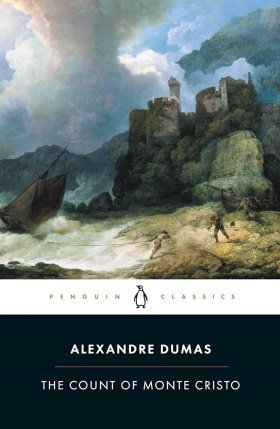“If I guess rightly, will you confess it?”
“Yes.”
“On your honor?”
“On my honor.”
“You were going to ask me if the Count of Monte Cristo had arrived, or was expected.”
“Not at all. It is not of him that I am now thinking. I was going to ask you if you had received any news of Monsieur Franz.”
“Yes,—yesterday.”
“What did he tell you?”
“That he was leaving at the same time as his letter.”
“Well, now then, the count?”
“The count will come, of that you may be satisfied.”
“You know that he has another name besides Monte Cristo?”
“No, I did not know it.”
“Monte Cristo is the name of an island, and he has a family name.”
“I never heard it.”
“Well, then, I am better informed than you; his name is Zaccone.”
“It is possible.”
“He is a Maltese.”
“That is also possible.
“The son of a shipowner.”
“Really, you should relate all this aloud, you would have the greatest success.”
“He served in India, discovered a mine in Thessaly, and comes to Paris to establish a mineral water-cure at Auteuil.”
“Well, I’m sure,” said Morcerf, “this is indeed news! Am I allowed to repeat it?”
“Yes, but cautiously, tell one thing at a time, and do not say I told you.”
“Why so?”
“Because it is a secret just discovered.”
“By whom?”
“The police.”
“Then the news originated——”
“At the prefect’s last night. Paris, you can understand, is astonished at the sight of such unusual splendor, and the police have made inquiries.”
“Well, well! Nothing more is wanting than to arrest the count as a vagabond, on the pretext of his being too rich.”
“Indeed, that doubtless would have happened if his credentials had not been so favorable.”
“Poor count! And is he aware of the danger he has been in?”
“I think not.”
“Then it will be but charitable to inform him. When he arrives, I will not fail to do so.”
Just then, a handsome young man, with bright eyes, black hair, and glossy moustache, respectfully bowed to Madame de Villefort. Albert extended his hand.
“Madame,” said Albert, “allow me to present to you M. Maximilian Morrel, captain of Spahis, one of our best, and, above all, of our bravest officers.”
“I have already had the pleasure of meeting this gentleman at Auteuil, at the house of the Count of Monte Cristo,” replied Madame de Villefort, turning away with marked coldness of manner.
This answer, and especially the tone in which it was uttered, chilled the heart of poor Morrel. But a recompense was in store for him; turning around, he saw near the door a beautiful fair face, whose large blue eyes were, without any marked expression, fixed upon him, while the bouquet of myosotis was gently raised to her lips.
The salutation was so well understood that Morrel, with the same expression in his eyes, placed his handkerchief to his mouth; and these two living statues, whose hearts beat so violently under their marble aspect, separated from each other by the whole length of the room, forgot themselves for a moment, or rather forgot the world in their mutual contemplation. They might have remained much longer lost in one another, without anyone noticing their abstraction. The Count of Monte Cristo had just entered.

























